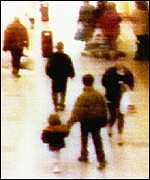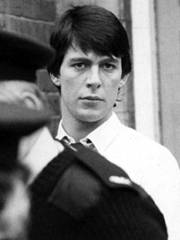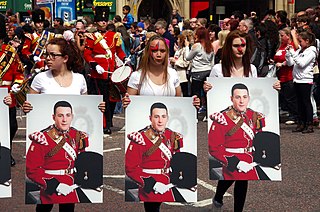Related Research Articles
The Bridgewater Four are four men who were tried and found guilty of killing 13-year-old paperboy Carl Bridgewater, who was shot in the head at close range near Stourbridge, England, in 1978. In February 1997, after almost two decades of imprisonment, their convictions were overturned and the three surviving defendants were released; the fourth defendant had died in prison two years into his sentence. Bridgewater's murder remains unsolved.
Barry Michael George is an English man who was found guilty of the murder of English television presenter Jill Dando and whose conviction was overturned on appeal.
Kenneth James Noye is an English criminal most recently on licence from a sentence of life imprisonment for the murder of Stephen Cameron during a road rage incident while on licence from prison in 1996. He was arrested in Spain two years after the crime and convicted four years later.
The murder of Harry Collinson, the planning officer for Derwentside District Council, occurred on 20 June 1991 at Butsfield, County Durham, England. At the time of the murder, Derwentside District Council was involved in a dispute with Albert Dryden, a local landowner, over the erection of a dwelling on his rural property without planning permission. At approximately 09:00 on 20 June, as television news crews filmed, Dryden aimed a handgun—a .455 Webley Mk VI revolver—at Collinson and shot him dead. As the journalists and council staff fled, Dryden opened fire again, wounding BBC television reporter Tony Belmont and Police Constable Stephen Campbell.
The conviction of Liverpool F.C. supporter Michael Shields resulted from the attempted murder of Bulgarian citizen Martin Georgiev on 30 May 2005 with a paving slab in the Black Sea resort of Golden Sands, Bulgaria, following Liverpool F.C.'s 2005 UEFA Champions League win. Shields was arrested and subsequently convicted for the attack. Shields launched two appeals against his conviction amid a high-profile campaign, in 2005 and 2006, but they both failed and the original verdict was affirmed. His prison term was reduced from 15 to 10 years after the second appeal – but with an increase in fine. With parole, he would have been due for release in 2010.

Oscar Leonard Carl Pistorius is a South African former professional sprinter and convicted murderer. Both of his feet were amputated when he was 11 months old as a result of a congenital defect; he was born missing the outside of both feet and both fibulae. Pistorius ran in both nondisabled sprint events and in sprint events for below-knee amputees. He was the 10th athlete to compete at both the Paralympic Games and Olympic Games.
On 14 September 2003, Toni-Ann Byfield and Bertram Byfield were murdered by Joel Smith at a bedsit in Kensal Green, London. At the time of her murder, Toni-Ann was formally under the care of Birmingham social services.
Peter Connelly was a 17-month-old British boy who was killed in London in 2007 after suffering more than fifty injuries over an eight-month period, during which he was repeatedly seen by the London Borough of Haringey Children's services and National Health Service (NHS) health professionals. Baby P's real first name was revealed as "Peter" on the conclusion of a subsequent trial of Peter's mother's boyfriend on a charge of raping a two-year-old. His full identity was revealed when his killers were named after the expiry of a court anonymity order on 10 August 2009.
Colin Duffy is an Irish republican, described by the BBC as the most recognisable name and face among dissident republicans in Northern Ireland. He was cleared of murder charges in three court cases involving police and army killings.

On 12 February 1993 in Merseyside, two 10-year-old boys Robert Thompson and Jon Venables, abducted, tortured, and murdered a two-year-old boy, James Patrick Bulger. Thompson and Venables led Bulger away from the New Strand Shopping Centre in Bootle, after his mother had taken her eyes off him momentarily. His mutilated body was found on a railway line two and a half miles away in Walton, Liverpool, two days later.

Lynette Deborah White was murdered on 14 February 1988 in Cardiff, Wales. South Wales Police issued a photofit image of a bloodstained, white male seen in the vicinity at the time of the murder but were unable to trace the man. In November 1988, the police charged five men with White's murder, although none of the scientific evidence discovered at the crime scene could be linked to them. In November 1990, following what was then the longest murder trial in British history, three of the men were found guilty and sentenced to life imprisonment.
Events from 2000 in England

Jeremy Nevill Bamber is a British convicted mass murderer. He was convicted of the 1985 White House Farm murders in Tolleshunt D'Arcy, Essex, in which the victims included Bamber's adoptive parents, Nevill and June Bamber; his adoptive sister, Sheila Caffell; and his sister's six-year-old twin sons. Returning a majority guilty verdict, the jury found that, after committing the murders to secure a large inheritance, Bamber had placed the rifle in the hands of his 28-year-old sister, who had been diagnosed with schizophrenia, to make the scene appear to be a murder–suicide.
The innocent prisoner's dilemma, or parole deal, is a detrimental effect of a legal system in which admission of guilt can result in reduced sentences or early parole. When an innocent person is wrongly convicted of a crime, legal systems which need the individual to admit guilt — as, for example, a prerequisite step leading to parole — punish an innocent person for their integrity, and reward a person lacking in integrity. There have been cases where innocent prisoners were given the choice between freedom, in exchange for claiming guilt, and remaining imprisoned and telling the truth. Individuals have died in prison rather than admit to crimes that they did not commit.
Ronald Leonard Easterbrook was a convicted armed robber and self-confessed career criminal. Easterbrook is most notable for going on hunger strike in protest over his conviction for an armed robbery in Woolwich in November 1987 in which fellow armed robber Anthony Ash was shot dead by police.

On the afternoon of 22 May 2013, a British Army soldier, Fusilier Lee Rigby of the Royal Regiment of Fusiliers, was attacked and killed by Islamist terrorists Michael Adebolajo and Michael Adebowale near the Royal Artillery Barracks in Woolwich, southeast London.

The trial of Oscar Pistorius for the murder of Reeva Steenkamp and several gun-related charges in the High Court of South Africa in Pretoria opened on 3 March 2014. Pistorius was a leading South African runner who won attention as an athlete with a disability competing at a high level, including at multiple Paralympic Games and the 2012 Summer Olympics. Steenkamp, a model, had been Pistorius's girlfriend for three months. In the early morning of Thursday, 14 February 2013, Steenkamp was shot and killed by Pistorius at his Pretoria home. Pistorius acknowledged that he shot Steenkamp, but he said that he mistook her for an intruder. Pistorius was taken into police custody and was formally charged with murder in a Pretoria court on 15 February 2013. The entire trial was broadcast live via audio, and parts of the trial were also broadcast live via television.

In April 2015, an underground safe deposit facility in Hatton Garden, London, owned by Hatton Garden Safe Deposit Ltd., was burgled.
Robert Brown is a Scottish man who spent 25 years in jail for a crime he did not commit, the murder of worker Annie Welsh.
References
- 1 2 3 4 Gillan, Audrey (20 April 2000). "Bleak world of the loner who killed" . Retrieved 6 November 2015.
- ↑ Foggo, Daniel (21 December 2003). "Season's greetings from Tony Martin". The Telegraph. London. Retrieved 3 April 2012.
As he approaches his 59th birthday later this month,…
- 1 2 3 "Tony Martin: Crime and controversy". BBC News . 13 June 2003. Retrieved 13 February 2007.
- ↑ Real Crime, ITV1
- ↑ "Tony Martin free in a year". 30 October 2001.
- ↑ Shotgun#Legal issues
- ↑ Morris, Steven (30 October 2001). "The killer who won a nation's sympathy". The Guardian. London.
- ↑ Gillan, Audrey (26 April 2000). "Bleak world of the loner who killed". The Guardian. London.
- ↑ Duffin, Claire (19 August 2014). "Tony Martin, 15 years on: I don't want to go back there because it could happen again" – via www.telegraph.co.uk.
- 1 2 3 4 5 "Timeline: The Tony Martin case". BBC News . 28 July 2003. Retrieved 13 February 2007.
- ↑ Alleyne, Richard (31 October 2001). "Killer who was a hero to victims of crime". The Telegraph. London.
- ↑ "BBC News - UK - Burglars were experienced criminals". news.bbc.co.uk.
- 1 2 Brook, Damien (7 August 2000). "Burglar's family set to sue Martin". The Independent. London. Retrieved 5 February 2011.
- ↑ Michael T. W. Arnheim (2004). The handbook of human rights law: an accessible approach to the issues and principles. Kogan Page yarite Publishers. pp. 88, 205. ISBN 978-0-7494-3498-4.
- ↑ "A victim, not a hero". The Guardian. London. 29 July 2003. Retrieved 14 February 2007.
- ↑ "Farmer guilty of murdering burglar". BBC News. 20 April 2000. Retrieved 13 February 2007.
- ↑ Rozenberg, Joshua (29 January 2018). "Tony Martin is told that he cannot appeal to Lords" . Retrieved 3 February 2022– via www.telegraph.co.uk.
- ↑ Turney, Bob (2005). Wanted!. Waterside Press. p. 60. ISBN 978-1-906-53464-6.
- ↑ "Court of Appeal, Law Report".
- ↑ "Martin's parole bid fails". BBC News . 16 January 2003. Retrieved 13 February 2007.
- ↑ "Tony Martin is a dangerous man, says parole chief", The Times, 27 May 2003. Retrieved on 16 June 2007
- ↑ "[2003] EWHC 1512 (Admin)". British and Irish Legal Information Institute.
- ↑ "Martin loses parole appeal". The Guardian . London. 8 May 2003. Retrieved 13 February 2007.
- ↑ Morris, Steven (6 June 2002). "Legal aid for burglar shot by Tony Martin". The Guardian. London. Retrieved 13 February 2007.
- ↑ Allison, Rebecca (20 August 2003). "Legal action by burglar 'in doubt'". The Guardian. London. Retrieved 13 February 2007.
- ↑ Morris, Steven (5 September 2003). "Martin burglar back in custody". The Guardian. London. Retrieved 25 May 2010.
- ↑ Morris, Steven (22 September 2003). "Martin expected to end legal dispute with burglar". The Guardian. London. Retrieved 13 February 2007.
- ↑ Thair Shaikh; Daniel Foggo (27 July 2003). "Tony Martin is 'going to get it', warns cousin of the boy he shot". London: telegraph.co.uk. Retrieved 16 October 2010.
- ↑ Ian Burrel (3 October 2003). "Payment to Tony Martin was justified, says PCC". The Independent. London. Retrieved 16 October 2010.
- ↑ Storer, Jackie (10 October 2003). "Martin urges 'decency' in politics". BBC News . Retrieved 13 February 2007.
- ↑ Traditional Britain Newsletter, Summer 2003, notice p.2
- 1 2 Foggo, Daniel (18 April 2004). "Vote BNP and give Britain a dictator, says Tony Martin". Daily Telegraph . London. Retrieved 13 February 2007.